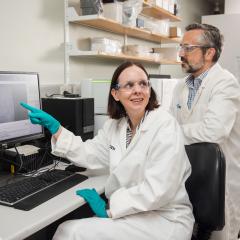The University of Queensland ranks in the top 50 in the world in 22 subjects, with the latest international rankings placing UQ first in Australia for Chemical Engineering and Environmental Sciences.
UQ was the only Australian university to make 44 of the 48 lists in the QS World University Rankings by Subject 2018.
Deputy Vice-Chancellor (Academic) Professor Joanne Wright said Chemical Engineering and Civil Engineering were also big improvers on the world stage, on the back of robust industry partnerships and strong investment in research and teaching.
UQ’s Law program leapt 12 places to be 36th in the world, with the overall ranking for Life Sciences and Medicine up two places to 30th.
Pharmacy and Pharmacology was ranked equal 25th in the world, up six places on last year’s result, driven by a substantial increase in research and international collaborations.
Biological Sciences also improved six places internationally and ranked second in Australia, along with Agriculture and Forestry, Materials Science, Sports-related subjects, and Hospitality and Leisure Management.
The rankings place UQ in the top three in Australia for Pharmacy, Communication and Media Studies and Veterinary Science.
Professor Wright said the strong results were a compelling endorsement of UQ’s focus on producing game-changing graduates to deliver globally significant solutions to the world’s challenges.
“UQ recognises that to achieve greater impact we must amplify our capacity to collaborate locally and abroad by developing knowledge seekers, innovators and leaders,” Professor Wright said.
“We are committed to attracting and retaining high-achieving staff and students, and responding agilely to the changing needs of employers.”
Professor Wright said the TC Beirne School of Law was an example of UQ offering the most relevant legal education via a highly-collaborative learning environment.
“The School is creating new research-led international learning opportunities, allowing students to gain unique insight into global legal practice in US, China and India, supplementing established programs in Europe.”


